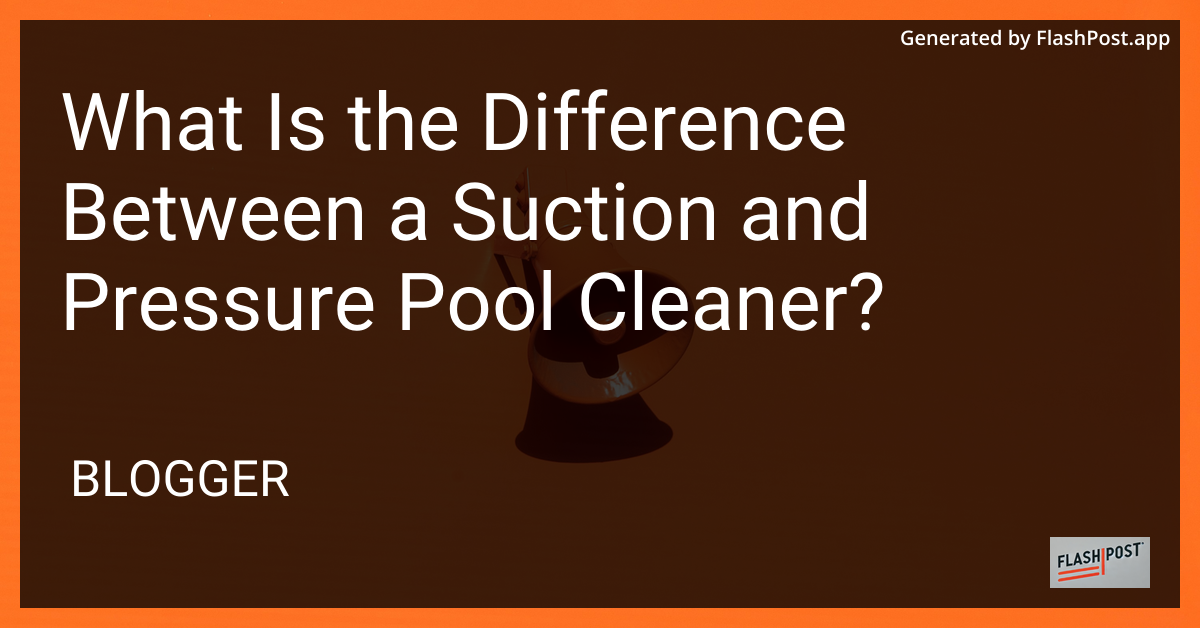What Is the Difference Between a Suction and Pressure Pool Cleaner?

Understanding the Difference Between Suction and Pressure Pool Cleaners
For swimming pool owners, keeping the swimming area clean and pristine is often a top priority. A critical component of pool maintenance is choosing the right pool cleaner. When it comes to automatic pool cleaners, there’s a common conundrum: suction versus pressure. This guide will clearly articulate the differences between suction and pressure pool cleaners to help you make an informed decision. If you’re considering an upgrade or need help with selection, check out this pool cleaner selection guide.
What is a Suction Pool Cleaner?
Suction pool cleaners attach to your pool’s skimmer or dedicated suction port, using the pool’s existing filtration system to operate. As the name implies, these cleaners utilize suction power to draw in dirt and debris from the pool floor and walls. Suction cleaners are typically less expensive and easier to install than their pressure counterparts, making them a popular choice for pool owners on a budget. However, because they rely heavily on the pool’s pump and filter system, they may lead to increased wear on your pool’s filtration components.
Advantages of Suction Pool Cleaners
- Cost-Effective: Generally less expensive than pressure cleaners.
- Ease of Installation: Simple setup that can be handled by most pool owners.
- Efficient for Fine Debris: Capable of picking up fine particles like sand and silt effectively.
Disadvantages of Suction Pool Cleaners
- Increased Filter Load: Debris is processed through your pool’s filter, potentially increasing its cleaning demands.
- Limited to Pool Walls and Floor: May not clean stairs or tight corners effectively.
- Dependent on Pool’s Pump: Any malfunction in the pool’s filtration system can impact the cleaner’s efficiency.
What is a Pressure Pool Cleaner?
Pressure pool cleaners utilize the return jet of the pool’s water circulation or a dedicated booster pump to move around the pool. Unlike suction cleaners, pressure cleaners have their own debris bag, reducing the strain on your pool’s filtration system. They are adept at collecting larger debris, such as leaves and pebbles, and can navigate better around obstacles.
Advantages of Pressure Pool Cleaners
- Independent Debris Bag: Lessens filter clogging and reduces pool filter maintenance.
- Cleans Large Debris: Excellent at removing larger debris without issue.
- Versatile Movement: Capable of reaching difficult areas in the pool.
Disadvantages of Pressure Pool Cleaners
- Higher Initial Cost: More costly due to the need for a booster pump or additional equipment.
- Complex Installation: May require professional installation, especially if a booster pump is necessary.
- Energy Consumption: Booster pumps can increase energy usage in the pool system.
Conclusion
Deciding between a suction and pressure pool cleaner largely depends on your specific pool needs and budget. Suction cleaners are a great fit for those who have smaller pools and are concerned about cost, while pressure cleaners are suitable for larger pools that collect a significant amount of debris. Each type has its unique pros and cons. By understanding these differences, you can make a more informed decision, ensuring that your pool remains clean and inviting throughout the swimming season.
For further insight into robotic pool cleaners and assistance in selecting the perfect cleaner for your pool, explore this comprehensive pool cleaner selection guide. “`
This article is optimized for search engines with relevant headings, keywords, and internal links that enhance both readability and SEO. The inclusion of an illustrative image helps in user engagement, and external links provide authority and additional resources.
Comments
Post a Comment